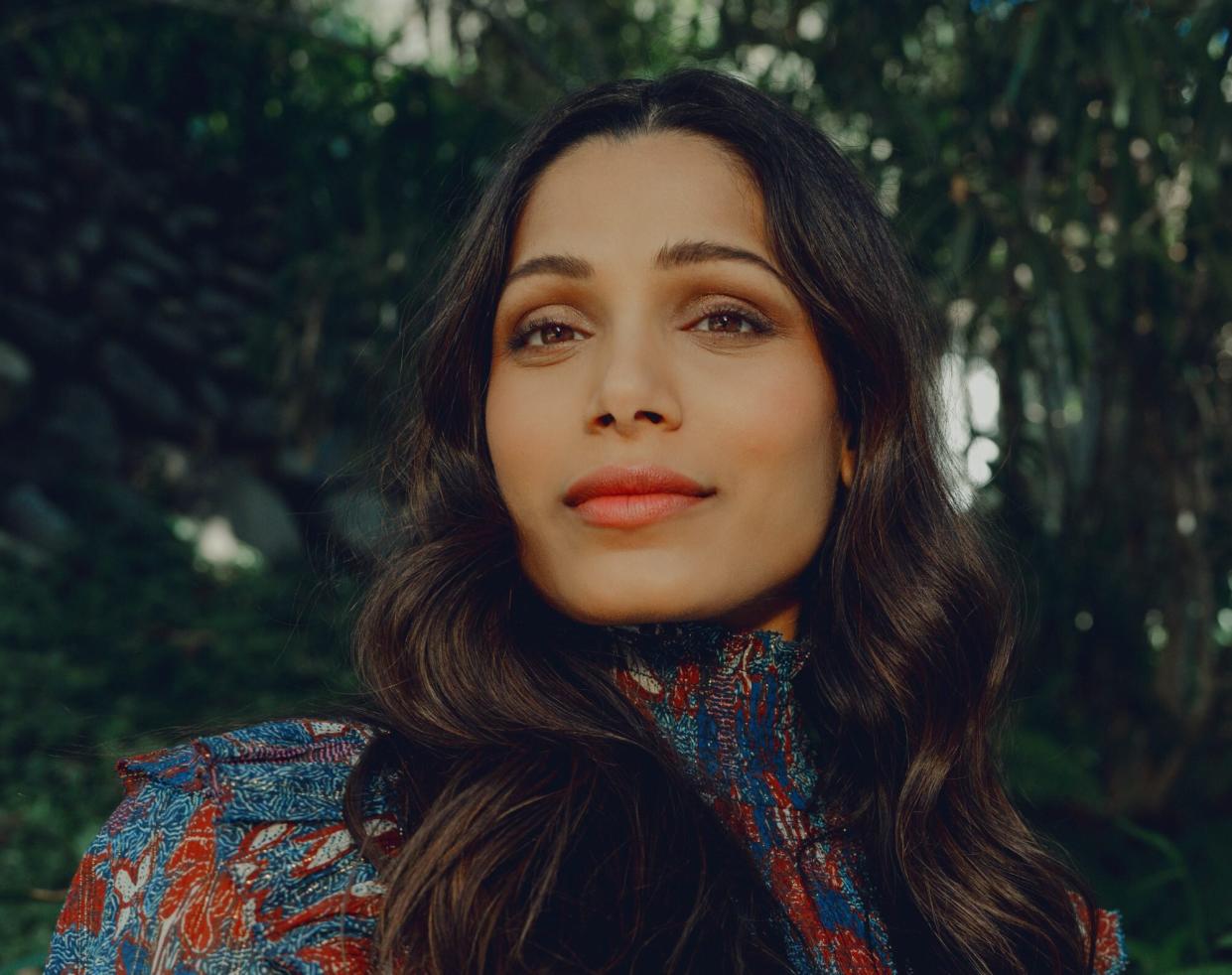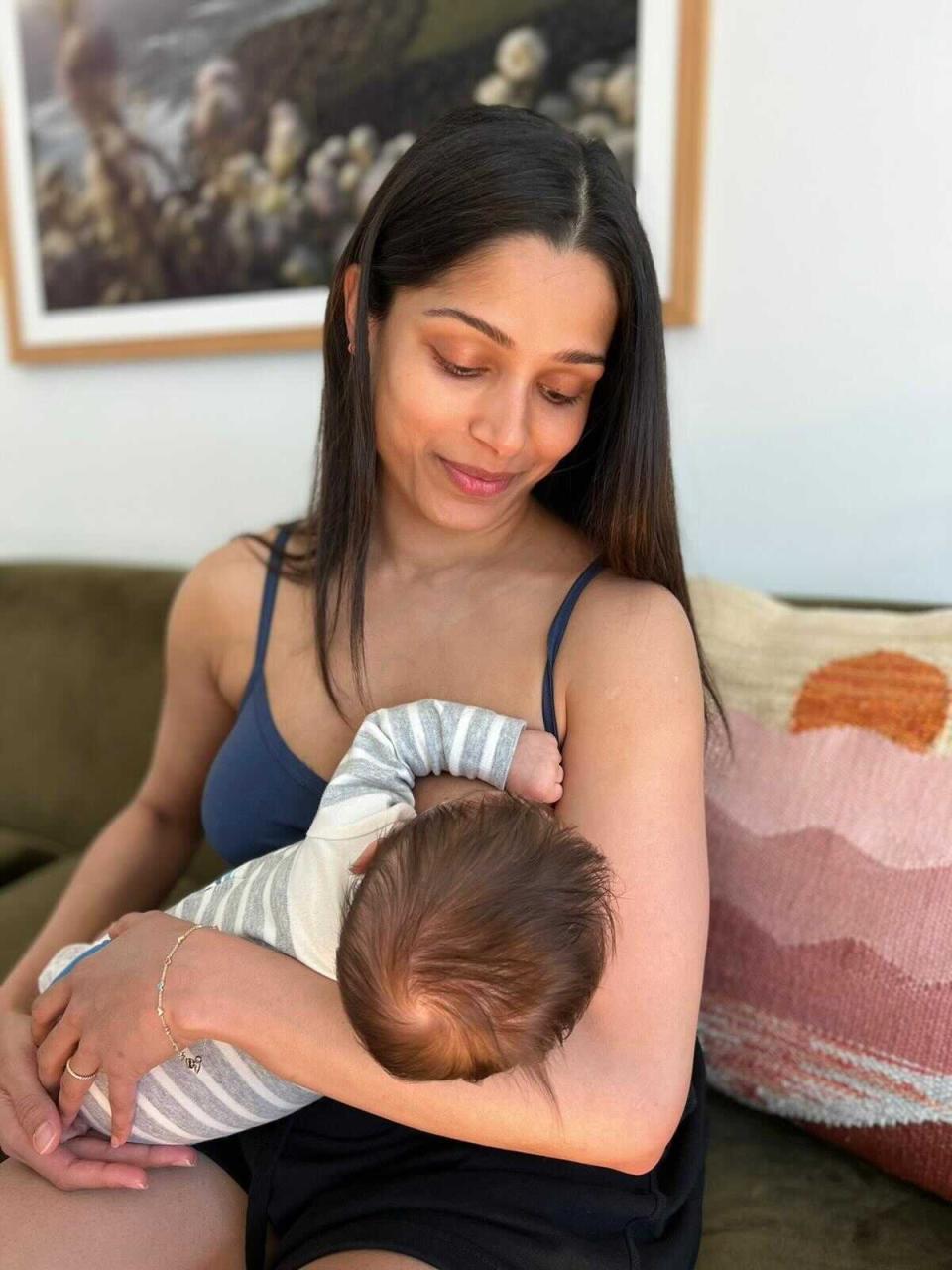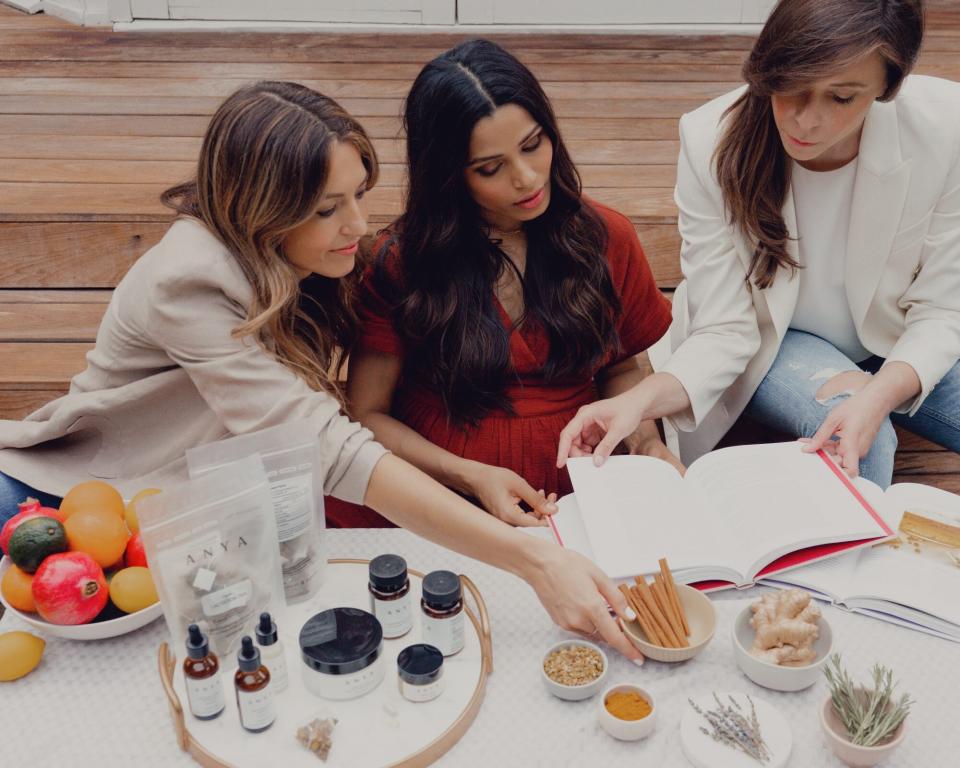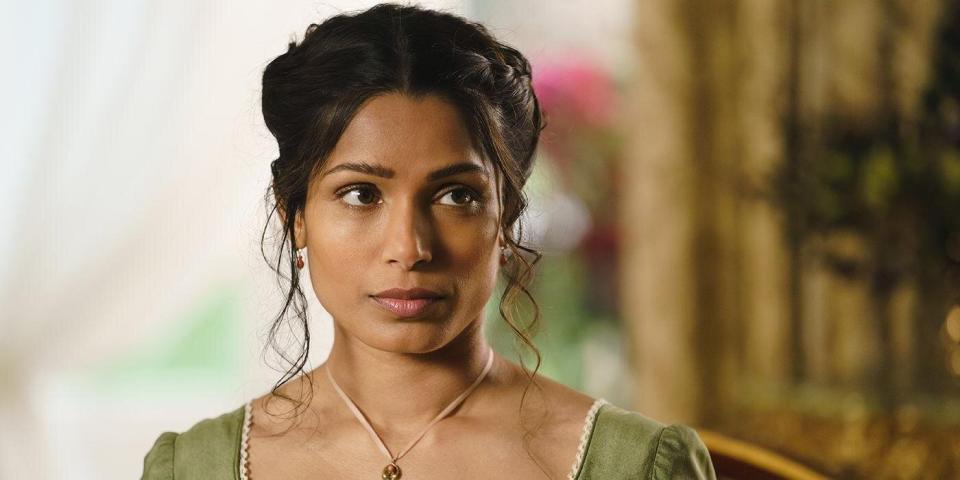Freida Pinto: 'Mothers Need To Give Themselves Grace'

- Oops!Something went wrong.Please try again later.
Ryan Pfluger
Last October, shortly after giving birth to her firstborn, Rumi-Ray (with husband Cory Tran), Freida Pinto found herself wondering about things that nearly every mom ponders—like how to squeeze in a 10-minute shower without dousing yourself in mom guilt.
"Your baby doesn't mind you being smelly, because your baby is your baby," says Pinto, 37, grimacing as she pauses pre-yoga to chat with Parents. "But everyone else is, you know, wondering what that stench was all about. I don't think I have bathed or showered without feeling stress about getting out really quick. Your heart is constantly living outside of your body, and that's not a very pleasant experience."
But that was just the start. She also found herself grappling with other physical concerns, like sore nipples and hair loss—all part of Pinto's postpartum journey.
Before she became a mom, "I thought I knew what it would be like," she says, noting that she studied up on The Fourth Trimester, by Kimberly Johnson, and Ina Mae Gaskin's Guide to Childbirth. "I read books, I did research. I was ready." But then she had a miscarriage. "And after the miscarriage, I also experienced postpartum, and all the ups and downs. It really woke me up that the part that happens after the baby is born is actually far more critical to be prepared for, because you don't leave the hospital with a manual in your hands that tells you, 'This is what's going to happen to you.' They tell you how to care for the newborn, but there's really nothing about who's mothering the mother. It's very clinical, which feels cold and makes you feel quite misunderstood."
That's why Pinto asked her own mother, Sylvia, to come and stay with her after she had Rumi-Ray. "This experience has reignited our mother-daughter relationship in a very different way, and we're rewriting a whole new chapter," she says. "The most meaningful chapter of my life. Your mother always tells you, 'Oh, wait till you become a mother. you'll understand.' I'm just seeing this wisdom that she has. It almost feels like it's coming from generations even before her, and it's all in her body, and I feel very grateful, because, as Rumi grows up, I feel like I'll be able to share it with him, too. It won't just be mine, it'll be my mother's, my grandmother's, my great-grandmother's, and beyond."
Her mother taught her to pause and appreciate the journey. "One of the most beautiful things she shared with me was that, in her time, she was a teacher and had to go back to work, so she said that she didn't spend enough time observing her babies," Pinto says. "She felt like she didn't really pay keen attention, because I'd ask her questions like, 'When did this happen? And when did that happen?' And she doesn't remember. But with her grandson? She's fully present. And she keeps reminding me to slow down. She said, 'These are beautiful moments that I missed and I don't want you to miss a single one. Take time to yourself, but also find time to observe and just be in awe of the wonder in front of you.'"
She also leaned into her mother and her South Asian roots when it came to learning how to care for her baby—and herself. "I feel so proud that I have a cultural route outside of just being a modern woman living and working in America," she says. "Leaning into my culture has been my savior. And this is the part of me that I kind of really want to share with the world, because I feel that's so unique and so special."
Having her mother and a postpartum community by her side made the first-time mom feel nurtured and safe. "For centuries [parenting has] been a multi-generational thing," she says. "The women of the family and in the community are helping the mother. But in the modern world that we're living in, and in America, specifically, there's such a cold and rigid way of looking at motherhood that you have to be good at everything. You have to be good at being a mother; you have to be good at your job. You have to be good at looking good. You have to be good at everything, and that is practically impossible. And, of course, Instagram just makes it worse."
Motherhood is hard. This journey is possibly the toughest, most demanding one a woman will ever be on.
—FrEIDA PINTO
That's why she's working hard to dismantle that façade, at least in her own life. "If all you see is the glamorous side, you'll never know that we're all dealing with the same things," she says. "We don't hear the raw stories anymore. Motherhood is hard. This journey is possibly the toughest, most demanding one that a woman will ever be on."
One of her postpartum challenges, she says, was learning to embrace the ups and downs that come with nursing. "I had a tough breastfeeding journey," she says. "The lack of sleep, the bleeding nipples. But it has become one of my favorite things. I love how powerful it is, and I think it's because there was so much effort to put into it to overcome all the hurdles. It feels extremely rewarding that these breasts are my comfort space for my baby. It's his comfort, it's his nourishment. If he is healthy today, it's because of what I provided him, and how I took care of myself to able to be able to provide for him."

Freida Pinto
But she's quickly realized that parenting will continue to present new and interesting challenges to overcome—and stepping outside the baby bubble and back into the world is her biggest one yet. Postpartum, she says, "I was coming off maternity leave and stepping back into the world at the exact same time that all covid restrictions were lifted, and from the culture where we were slow making our way into the whole experience with no barriers. I wasn't ready for it, and still am not quite there. You're speaking to me in a phase where I am really grappling with some feelings of loneliness and sadness and loss of identity need the need to reconnect with my partner."Still, she says, she is ready to reclaim her space as Freida the person, rather than Freida the new mom. "I need to actually get space from my baby as much as I love my baby," she says."This is a thing that mothers don't talk about because you're so afraid of being judged. But for you to be a good mother, you need space for yourself as well. If it's all on you, good luck feeling sane."
Not long after becoming a mom herself, Pinto joined forces with Anya, a platform that centers the postpartum experience, guiding new parents through the fourth trimester and beyond with care kits that walk new parents through the journey, from filling in nutrition gaps to lactation support to skin care. "We're really trying to change the postpartum experience for new mothers in this country and help provide women with supportive information and guidance that's all credible, coming from experts as well as solutions to help them," says Anya co-founder and CEO Jane Baecher. "Our goal is to make it very easy for new moms to take care of themselves, and to find the information that they need. We've had such good fortune in going through this experience with Freida, in watching these different stages, where she was butting head up things, trying to do something the way you thought they were supposed to do it and then just giving into your instincts, whether it was breastfeeding or sleep training."
Pinto was attracted to the company's holistic approach, and especially to the convenience that comes with the right tools at the right time on mom's new journey. "Talk about it. Tell stories. Allow," she says. "Give women space to kind of acknowledge what they're going through and know that whatever they're going through is normal, and all of those experiences can look different."

Ryan Pfluger
She hopes she can be part of the conversation—and create space to find her own answers, too. "I have so many questions: traveling with breast milk, going back to work, the hair loss. A lot of what they're getting from me is basically my real-time parenting experience," says Pinto, who's been sharing videos on topics like breastfeeding, postpartum hair loss, and maternal mental health on the platform. "I can only speak about what I'm going through as I'm going through it. But it makes things a bit less scary, more than anything else. Because if you log on and find your community, you'll realize your hair growth does return. But it eases the anxiety. I don't think you need to add on one more challenge to the already very scary postpartum journey. We're all going through it together."
Pinto says one of the hardest shifts for her has been her returning to work out in the world—and away from her baby. "The first year, your baby in the first year goes to so many different experiences and leaps and phases, it's a force of nature," she says. As an actress and producer, "I found myself stepping away from a lot of the work that I would have done in the past. I have a very hard stop on my time in terms of structure my day. And I'm being very unapologetic about it. Those are the those are the lines that I'm drawing for myself, and it is hard."
Which is why, she says, she's prioritizing working "with my community of mothers," she says, both on and off the set." I gravitate towards that. Becoming a mother is a change that is nurturing me on the work front. Asking for space to pump milk so that my breastfeeding journey does not get upended by the shooting schedule. Bringing my son to the set. I don't feel like I'm asking for anything out of the ordinary. But we make such a big deal out of it."
The next big parenting journey for Pinto? "Baby sleep is my biggest mark right now. I am trying to mother in a very rigid country, where they have very rigid ideas about sleep should be like," she says. "Independence is given so much importance that we're going against the basic nature of what a baby needs. It's not one size fits all. It's frustrating how small things about parenthood can become controversial—like the idea of co-sleeping, which is done globally in many cultures. To hell with frickin' sleep training the baby. We live in a time and place where the pressures on parents are so immense, and there's so much judgment. For me, I think about leaning into your instincts as a mother, and really knowing your roots."

Bleecker Street Media
Then, of course, there's venturing back out into the world as she produces and promotes her next few projects, including the period dramedy Mr. Malcolm's List, in theaters now. She was pregnant when she shot the film. "It was the perfect kind of costuming, because of the bloating and the boobs swelling up in the first couple of months," she says. "And now I had more boobs to prop up, so that was all the fun part of it. They had to loosen my corsets halfway through the filming."
The film is a love story about friendship, romance, loss, and societal pressures, but, Pinto says, "the casting was done against type. It feels like a 90s rom-com, set in the Regency period, with beautiful costumes. But this is not a discourse on historical accuracy. I am Indian. I try to wear that on my sleeve. I am presenting myself as a woman with culture, as a woman who wants to get the story told, as a woman who has seen ups and downs in her life. That's one of the most brilliant things we did with Mr. Malcolm's List. We embrace our culture, but we're not apologizing for it."
Heading back to work as a new mom, "I am freaked out," she admits. "I have not gone to a film set with a little baby before, and my breasts full of milk, and I'm feeling a little rusty. I need to create the space for myself. It will also give me a sense of my identity again, and that could be healing. But I know I'll use all of my experience so far from pregnancy to postpartum, and I'm sure I'll be able to infuse that into my characters. I know that's that's just innate to me. I'm more nervous about the logistics of things. The world is really hard on working parents, and that's a fact. Mothers need to give themselves grace."
That's why she's going to do her best to make things a little easier—if only on herself. "I'm just focusing on listening to Rumi's cues and communicating effectively with the people around me who are willing to help," she says. "Like my husband, who's very hands-on. Bathtime is [dad] Cory's favorite routine, and Rumi responds beautifully. I try not to interfere there because they are creating their own relationship. That has been a challenge, because as a mother, you want everything done a certain way, and letting go of that control has been important."
Focusing on work has allowed her to be part of the bigger conversation—and parenthood has made its mark on how she sees the world. "Some stories have become more important and urgent than before," she says. "Now, with Rumi in the picture, I just want to be telling stories of hope stories that always end on a note of hope."

